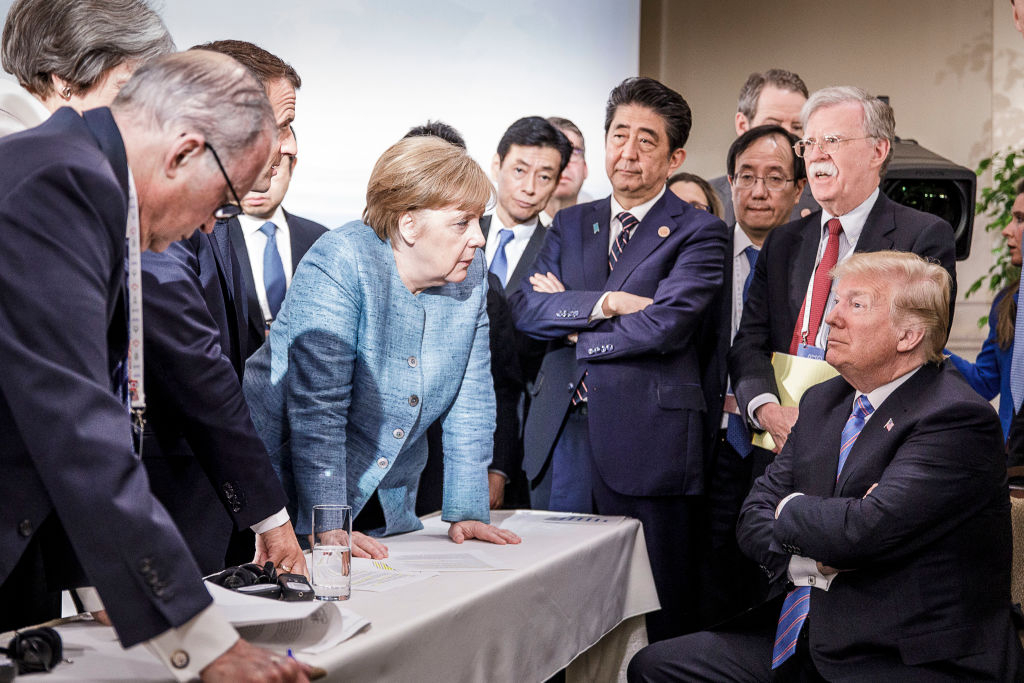Europe: Fear of the Elephant and Its Mahout

European dislike for the person of Donald Trump, who is cast as the antithesis of the Davos-approved globalist worried about global warming, not interested in chest-beating about Palestine, and demanding that others not treat the US as a “room service” reachable by pressing a button, is running shivers down many spines in Paris and Berlin among other places. Pictured: Then president Trump and other heads of state deliberate at the G7 summit on June 9, 2018 in Charlevoix, Canada.
European dislike for the person of Trump, who is cast as the antithesis of the Davos-approved globalist worried about global warming, not interested in chest-beating about Palestine, and demanding that others not treat the US as a “room service” reachable by pressing a button, is running shivers down many spines in Paris and Berlin among other places.
This is why many Europeans prefer to see the Democrat donkey rather than the Republican elephant in the room. They miss the fact that the absent, that is present in the room, is neither the elephant nor the donkey but the leviathan.
In the recent summit in Paris of European Union leaders on Ukraine, there was an elephant in the room: The US Republican Party and its current mahout, former President Donald J. Trump.
According to those who were able to peep into the session, much of the discussion was about what the US will or won’t do in case the volatile mahout rides his elephant into the White House in November.
Trump’s musings about ending the war in Ukraine and taming Vladimir Putin without war and his quip about refusing to support a NATO member not paying its share, if attacked by Russia, took up a disproportionate part of the discussions. Then came the French President Emmanuel Macron’s bombshell about boots on the ground in Ukraine.
What went on in the much-advertised summit, also attended by British Foreign Secretary Lord Cameron, resembled pub talk rather than serious strategizing by grown-up statesmen.
The first assumption was that Trump, having passed through the judicial minefield created against him by his foes and won all the chips on Super Tuesday, has the Republican nomination already sewn up. This may well prove to be the case.
However, in the current state of US politics, it is prudent not to forget the imponderables.
The next assumption was that Trump would defeat the incumbent, President Joe Biden, who is also assumed to be the Democrat Party’s nominee.
The third assumption, the really questionable one, is that whoever sits in the White House is “the most powerful man” on earth and a captain capable of turning the giant cruiser that is the American ship of state.
That reminds me of some of the observations made by former US Secretary of State George Shultz, arguably one of the wisest US statesmen in recent times. Shultz believed that the general assumption that the US president can do whatever he likes is misleading. He believed that in Washington, nothing is ever decided once and for all, and every issue is a battle royal. In that power game, the president is a key player but by no means always the only decisive one. More importantly, perhaps, though the US has mind-boggling power, the president is never allowed to use more than a small slice of it.
As captain of the cruiser, the president is capable of slightly adjusting the speed, adding or subtracting ports of call and choosing the mood music and the daily menu.
Conspiracy theorists might conclude that there is a “deep state” that runs the “only remaining superpower”, the “indispensable country”.
They are right. But they are wrong in thinking that the “deep state” consists of the “military-industrialist network”, as former President Dwight D. Eisenhower said, or “Wall Street and the media barons.”
The “deep state” was discovered by the 17th-century philosopher Thomas Hobbes and named “Leviathan”. Hobbes’ “cold monster” was supposed to be the perfect state headed by an absolute ruler. If we set aside the phrases “the perfect state” and “absolute ruler” as literary conceits rather than political concepts, we see the “Leviathan” as the reality of a state whose chief interest and highest priority is self-preservation.
When it acts, it is strictly in its own interest, its ethical justification being its ability to prevent the “everyone against everyone” situation and the law of the jungle.
Back to our present discussions: no US president can do something without the at least implicit approval of the “cold monster.”
In a telephone call last week, a friend, a New York banker, said he wondered how the American economy wasn’t doing “too badly” under an aging president with a shrinking attention span.
Another friend from Florida wonders why Biden has taken almost 100 more actions on immigration than Trump did in his four-year presidency. (535 as opposed to 472). Even then, the record for expelling illegal immigrants is still held by President Barack Obama.
The list could be longer.
Why has Biden failed to undo Trump’s supposedly hostile approach to “global warming”, in fact, the currently fashionable saving the planet pseudo-theological-politics? Despite much fuming about relocating the US Embassy in Israel from Tel Aviv to Jerusalem, Biden has ignored “Palestine first” among his followers’ demand for an urgent backtracking. Even when there was no war in Ukraine, Trump urged NATO members to increase their defense expenditures and did the same in the US. Biden has pursued the same policy, albeit in a less colorful way.
In any case, an American presidential term is too short to allow for strategic changes of the course in key areas of policy. Supposing Trump wins in November, he would have to wait more than two months before he is sworn in. He would then spend months forming a Cabinet and getting his team approved by Congress. Once his first year is completed and he has set his cruising speed, he would have to attend to midterm elections before he becomes a lame duck.
Worse still, with the exception of Eisenhower, almost all US presidents since Harry Truman have had to cope with different diversions. Truman had the Korean War while John F. Kennedy intervened in Vietnam and Lyndon Johnson were bogged down there. Richard Nixon ended up with Watergate and Gerald Ford with the Mayaguez scandal and the overspill of the war to Cambodia. Jimmy Carter was caught by the “Tehran hostages” fiasco, and Ronald Reagan stepped into the “Iran-Contra” minefield. George H.W. Bush had his one term dominated by the war to push Iraq out of Kuwait. Bill Clinton had to cope with a sex scandal and impeachment procedure. The war in Afghanistan and the second Iraq war consumed much of George W. Bush’s presidency.
Macron’s belief that a change in the US presidency could mean a strategic change in US global policies is a relic of the monarchist culture which, even after beheading the king, dominates French political analysis.
European dislike for the person of Trump, who is cast as the antithesis of the Davos-approved globalist worried about global warming, not interested in chest-beating about Palestine, and demanding that others not treat the US as a “room service” reachable by pressing a button, is running shivers down many spines in Paris and Berlin among other places.
This is why many Europeans prefer to see the Democrat donkey rather than the Republican elephant in the room. They miss the fact that the absent, that is present in the room, is neither the elephant nor the donkey but the leviathan.
Amir Taheri was the executive editor-in-chief of the daily Kayhan in Iran from 1972 to 1979. He has worked at or written for innumerable publications, published eleven books, and has been a columnist for Asharq Al-Awsat since 1987. He is the Chairman of Gatestone Europe.
egretnewseditor@gmail.com

























